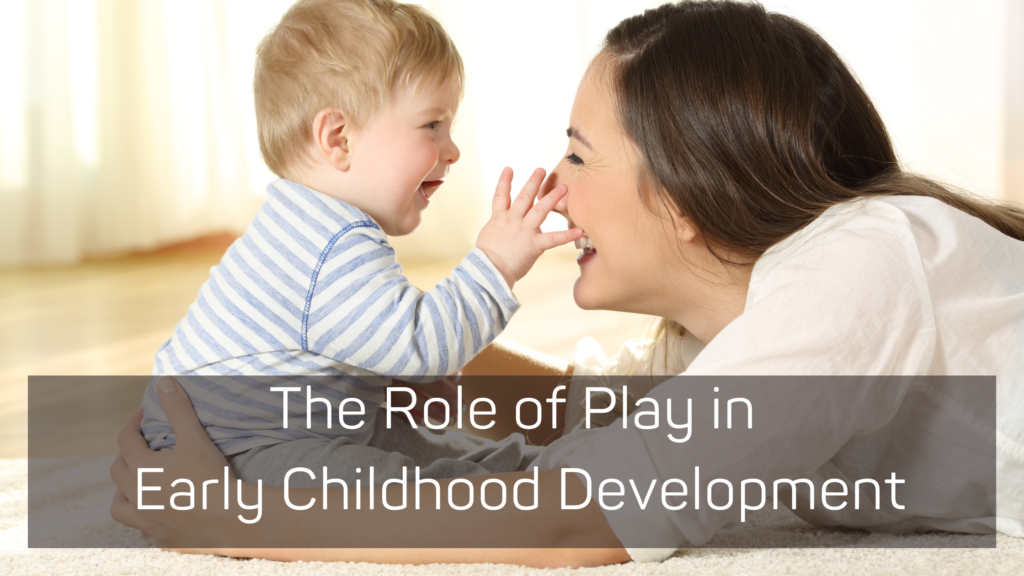Childhood is a critical period for growth, development, and learning. During this time, children explore the world around them, develop their cognitive and physical abilities, and acquire social and emotional skills. One of the most important ways in which children learn and develop is through play. Play is not just a way to pass the time; it is a crucial aspect of early childhood development. In this blog post, we will explore the role of play in early childhood development and provide actionable insights on how parents and educators can support and enhance this process.
Why Play Matters
Play is often seen as an activity with no apparent purpose, but in reality, it serves several important functions in a child’s development:
- Cognitive Development: Play helps children develop their thinking, problem-solving, and decision-making skills. When children engage in imaginative play, they create scenarios, make decisions, and solve problems, which enhances their cognitive abilities.
- Language Development: Play provides opportunities for children to practice and improve their communication skills. Whether it’s engaging in pretend play or engaging in conversations with peers, children develop their vocabulary, grammar, and expressive language skills through play.
- Social Development: Play allows children to interact with their peers, practice social skills, and learn how to cooperate, negotiate, and resolve conflicts. Through play, children develop empathy, learn to take turns, and understand the perspectives of others.
- Physical Development: Play promotes physical fitness and development. Whether it’s running, climbing, jumping, or engaging in fine motor activities such as drawing or building with blocks, play helps children develop their gross and fine motor skills.
- Emotional Development: Play provides a safe space for children to express and regulate their emotions. Through play, children learn to manage their feelings, cope with stress, and develop resilience.
Types of Play
Play can take many forms, and each type of play offers unique benefits for children’s development. Here are some common types of play:
1. Unstructured/Free Play
Unstructured play refers to play that is child-initiated and child-directed. It allows children to freely explore, create their own rules, and follow their interests. Unstructured play encourages creativity, problem-solving, and independent thinking.
2. Pretend/Imaginative Play
Pretend play involves children using their imagination to create scenarios and take on different roles. Whether it’s playing house, pretending to be superheroes, or engaging in make-believe adventures, pretend play helps children develop their creativity, empathy, and narrative skills.
3. Physical/Outdoor Play
Physical play involves activities that encourage movement and exercise. Whether it’s running, jumping, climbing, or playing sports, physical play promotes physical fitness, coordination, and gross motor skills.
4. Constructive/Manipulative Play
Constructive play involves building, creating, and manipulating objects. Whether it’s building with blocks, assembling puzzles, or playing with LEGO, constructive play enhances children’s problem-solving, spatial awareness, and fine motor skills.
5. Social/Cooperative Play
Social play involves interaction with other children. Whether it’s playing board games, engaging in group activities, or collaborating on a project, social play helps children develop their social skills, teamwork, and cooperation.
Supporting Play in Early Childhood
As parents and educators, there are several ways we can support and enhance play in early childhood:
- Provide a Safe and Stimulating Environment: Create an environment that is safe, inviting, and conducive to play. Ensure that there are age-appropriate toys, materials, and equipment available for children to explore and engage with.
- Allow for Unstructured Play: Give children the freedom to engage in unstructured play. Provide open-ended materials and opportunities for children to use their imagination, create their own games, and follow their interests.
- Encourage Pretend Play: Provide props, costumes, and materials that encourage pretend play. Engage in role-playing with your child, participate in their imaginative play scenarios, and ask open-ended questions to stimulate their creativity.
- Promote Outdoor Play: Create opportunities for children to engage in physical play outdoors. Encourage them to explore nature, play games that involve running and jumping, and provide outdoor toys and equipment that promote active play.
- Facilitate Social Interactions: Arrange playdates, encourage group activities, and provide opportunities for children to interact with their peers. Model positive social behaviors, such as sharing and taking turns, and help children navigate conflicts and resolve disputes.
Case Study: The Importance of Play-Based Learning in Preschools
Play-based learning is an approach to early childhood education that recognizes the value of play in children’s development. It combines structured learning experiences with opportunities for child-directed play. Research has shown that play-based learning in preschools offers several benefits:
- Holistic Development: Play-based learning supports children’s cognitive, social, emotional, and physical development. It provides a well-rounded approach to education, allowing children to learn and develop in multiple areas simultaneously.
- Intrinsic Motivation: Play-based learning taps into children’s natural curiosity and intrinsic motivation to learn. When children are engaged in play, they are more motivated to explore, experiment, and discover new things.
- Creativity and Problem-Solving: Play-based learning promotes creativity and problem-solving skills. Through play, children learn to think outside the box, find innovative solutions, and adapt to new situations.
- Social Skills and Emotional Intelligence: Play-based learning provides opportunities for children to practice social skills, develop empathy, and regulate their emotions. It fosters collaboration, communication, and cooperation among peers.
- Long-Term Benefits: Research suggests that children who experience play-based learning in preschools have better academic outcomes, higher self-esteem, and improved social skills compared to those in more traditional, didactic learning environments.
Conclusion
Play is a powerful tool for early childhood development. It supports children’s cognitive, social, emotional, and physical growth, and provides a foundation for future learning. By understanding the importance of play and providing opportunities for children to engage in various types of play, we can support and enhance their development. Whether it’s through unstructured play, pretend play, physical play, constructive play, or social play, let’s embrace and encourage play as a vital component of early childhood education.
Remember, play is not just a break from learning; it is an essential part of learning itself.

